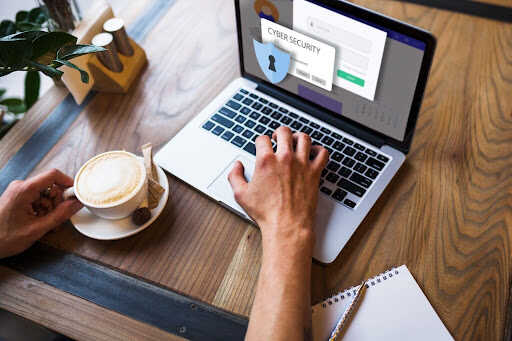Many students go online every day without even thinking about the threats they encounter. Nevertheless, hackers use every opportunity to get sensitive data from you.
You must pay attention to web security to avoid a very unpleasant experience. Without a doubt, it can take a while before you get used to logging out of your accounts and updating software all the time.
However, every step you take to prevent yourself from insecure internet connections and suspicious requests from strangers makes your student life easier.
This article will tell you about the seven main principles of how to stay safe while surfing virtual reality platforms.
Web Security for Students: 7 Main Principles

1. Practice Safe Online Shopping
It is impossible to imagine the life of modern students without online shopping. Whether you want to buy a new hoodie or get essay help for students from online experts, you will need to provide payment details.
Therefore, purchase from reputable online retailers with secure payment options. Choose what options are available before you start adding products to your shopping basket.
Avoid entering credit card details on unfamiliar or insecure websites. Before entering sensitive information, look for the padlock symbol and “HTTPS” in the website URL.
2. Pay Attention to Authentication and Authorization
It might be surprising to know that many students do not pay close attention to authentication mechanisms like passwords, two-factor authentication, etc.
They often forget or write their passwords somewhere others can easily read them. Strong authentication mechanisms are necessary to verify user identities and ensure users can only access what they’re allowed to.
Use two-factor authentication, which requires a second verification form, like a text message or authentication app, to ensure no one else can access your files.
The authorization process determines what users can and cannot access based on their roles and permissions. For example, if you share a file with other students, you can define if they can edit it.
3. Educate Yourself About Common Threats
Stay informed about common cyber threats like phishing, malware, and scams. For instance, here are some of the most popular phishing threats you want to stay away from:
- Email phishing. You receive emails that seem to be from legitimate sources like banks, universities, or popular websites. These emails often ask you to click a link and provide sensitive information or login details.
- Vishing. Attackers use phone calls to impersonate organizations like banks or tech support. They might ask for your personal information or remote access to your computer.
- Smishing. You receive deceitful text messages that often contain urgent messages or fake offers. These messages might include links that lead to malicious websites or request sensitive information.
- Spear phishing. Similar to email phishing, hackers gather information about a specific person to craft personalized messages that seem more credible. They might reference some specific details about you and your life, making the email appear legitimate.
- Fake surveys or contests. People use fake surveys, contests, or giveaways to attract students to provide personal information.
- Pharming. Hackers redirect students to fake websites resembling legitimate ones to steal login credentials or financial information.
- Job offer scams. You might get emails or messages offering fake job opportunities, scholarships, or internships. They could request personal information, payment for processing fees, or a money transfer.
To avoid sharing your information with such attackers, always verify the sender’s email address before opening any links or attachments.
4. Use Social Media Accounts Wisely
Without a doubt, you can’t live without social media nowadays. You need to know what is going on in the world and what your peers have to say.
Monitoring your online accounts for any unusual or unauthorized activity is crucial. If you spot anything suspicious, take immediate action to secure your account – change passwords and contact the platform’s support team if necessary.
When you receive a request for personal information or money from someone you don’t know via direct messages, verify the requestor’s identity before sharing any sensitive information.
It is also a good idea to set up your privacy settings to limit the amount of personal information visible to the public.
Be selective about the information you share on social media platforms to take care of your personal data properly. Finally, always log out after using online accounts, especially on public computers or shared devices.
5. Update and Backup
Regularly update your operating system, web browser, plugins, and applications. Updates often include security patches that can improve the system’s current operation system.
Also, ensure to back up important files to an external drive or cloud storage. In case of a security incident, you won’t lose valuable information. It is an especially sound tip if you are engaged in a massive project and have already done a lot of work to complete it.
6. Lock Your Devices

If you have ever watched a teenage comedy, you know what terrible consequences leaving your phone unlocked might have.
If you do not want to feel yourself playing a leading role in such a movie, use PINs, passwords, or biometric locks to secure your devices. Doing so prevents unauthorized access if your device is lost or stolen.
7. Secure Your Wi-Fi Network
Use a strong and unique password for your Wi-Fi network. You can also enable WPA3 encryption for improved security. Also, try to stay away from public Wi-Fi.
Even though it is a convenient way to stay online wherever you are, some hackers use it to get sensitive information from you. If you just need to use it anyway, avoid making online payments or logging in to your social media accounts.
Summing Up
As you can see, some of these steps are not that difficult to incorporate into your daily routine. Remember, no matter how exciting an email from someone you don’t know may seem, stop yourself from clicking the link right away.
Take a pause and check that email for security. Follow these rules to ensure your personal information stays safe.
It is a good idea to check the new schemes hackers use and stay alert for them. Spending that extra effort is better than getting the disappointing experience of someone stealing your money or identity.

